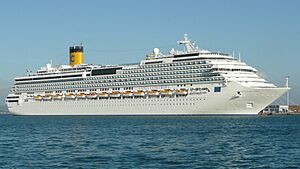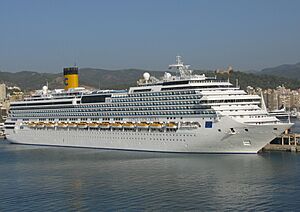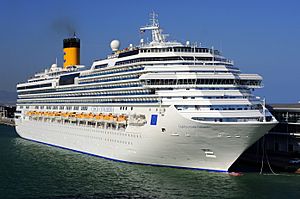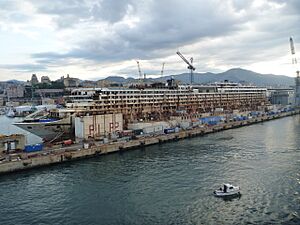Costa Concordia facts for kids

Costa Concordia in January 2008
|
|
| History | |
|---|---|
| Name | Costa Concordia |
| Owner | Carnival Corporation & plc |
| Operator | Costa Crociere |
| Port of registry | Genoa, Italy |
| Route | Western Mediterranean |
| Ordered | 19 January 2004 |
| Builder | Fincantieri Sestri Ponente, Italy |
| Cost | €450 million (£372 million, US$570 million) |
| Yard number | 6122 |
| Way number | 543 |
| Launched | 2 September 2005 |
| Christened | 7 July 2006 |
| Acquired | 29 June 2006 |
| Maiden voyage | 14 July 2006 |
| In service | July 2006 |
| Out of service | 13 January 2012 |
| Identification |
|
| Fate | Capsized and partially sank in 2012 off Isola del Giglio, Tuscany. Salvaged in 2014 and subsequently scrapped in Genoa, Italy in 2017. |
| General characteristics | |
| Class and type | Concordia-class cruise ship |
| Tonnage | 114,147 GT |
| Length |
|
| Beam | 35.50 m (116 ft 6 in) |
| Draught | 8.20 m (26 ft 11 in) |
| Depth | 14.18 m (46 ft 6 in) |
| Decks | 13 |
| Installed power |
|
| Propulsion |
|
| Speed |
|
| Capacity | 3,780 passengers |
| Crew | 1,100 |
The Costa Concordia was a very large cruise ship operated by Costa Crociere. It was the first of its kind, with sister ships like the Costa Serena. When it was built, it was one of the biggest ships made in Italy.
On January 13, 2012, the Costa Concordia hit a rock. This happened near Isola del Giglio in Italy. The collision made a large hole in the ship's side. Water rushed in, causing the engines to stop. The ship then tilted and drifted towards the island. It ended up lying on its side near the shore.
Getting everyone off the Costa Concordia took over six hours. There were 3,229 passengers and 1,023 crew members on board. Sadly, 32 people lost their lives. The ship's captain, Francesco Schettino, was found responsible for the accident. He was also found responsible for leaving the ship. The ship was later pulled upright and towed away. It was taken apart for scrap metal in 2017.
Contents
Building the Costa Concordia

The Costa Concordia was ordered in 2004. It was built by a company called Fincantieri in Genoa, Italy. The ship was launched on September 2, 2005. During the launch, a champagne bottle is usually broken on the hull. This is a tradition. However, the bottle did not break on the first try. Some people believe this was a bad sign for the ship.
The ship was given to Costa Cruises on June 30, 2006. It cost about €450 million to build. The name Concordia means "harmony" or "peace". It was chosen to show a wish for peace among European countries.
Ship Details
The Costa Concordia was 290.20 metres (952 ft 1 in) long. It was 35.50 m (116 ft 6 in) wide. The ship used a special diesel-electric system for power. Six large diesel engines created electricity. This power ran everything on the ship. It powered the motors that turned the propellers. It also powered the lights and air conditioning.
The ship could travel at a service speed of 19.6 knots (36 km/h; 23 mph). Its top speed was 23 knots (43 km/h; 26 mph).
Ship Layout
The Costa Concordia had 13 decks for passengers. Each deck was named after a country in Europe. Deck 1 was the lowest deck.
- Deck 1 Olanda (Holland)
- Deck 2 Svezia (Sweden)
- Deck 3 Belgio (Belgium)
- Deck 4 Grecia (Greece)
- Deck 5 Italia (Italy)
- Deck 6 Gran Bretagna (Great Britain)
- Deck 7 Irlanda (Ireland)
- Deck 8 Portogallo (Portugal)
- Deck 9 Francia (France)
- Deck 10 Germania (Germany)
- Deck 11 Spagna (Spain)
- Deck 12 Austria (Austria)
- Deck 14 Polonia (Poland)
Fun Things on Board

The Costa Concordia had about 1,500 cabins. Many cabins had private balconies. Some even had direct access to the Samsara Spa. This spa was one of the largest at sea. It had a gym, pools, saunas, and a solarium.
The ship had four swimming pools. Two of these pools had roofs that could open. There were also five Jacuzzis. For dining, there were five restaurants. Guests could also visit thirteen different bars.
For entertainment, the ship had a three-level theater. There was also a casino and a futuristic disco. Kids had their own area with video games. There was even a basketball court. Other fun things included a Grand Prix motor racing simulator and an internet café.
Accidents and Incidents
2008 Bow Damage
On November 22, 2008, the Costa Concordia was damaged. Strong winds in Palermo, Sicily, pushed the ship against its dock. No one was hurt in this incident. Repairs to the front of the ship started soon after. The damage was fully fixed in 2011.
2012 Grounding and Partial Sinking
On January 13, 2012, the Costa Concordia left Civitavecchia, Italy. It was on a seven-night cruise. At 9:45 PM, the ship hit a rock. This happened off Isola del Giglio on Italy's coast. The collision created a 53-metre (174 ft) long hole in the ship's left side.
Water flooded the engine room. This caused the ship to lose power. The ship then tilted to its left side. Winds pushed the ship back towards Giglio Island. It eventually rested on its right side in shallow water.
Almost half of the ship stayed above water. But it was in danger of sinking completely. An order to leave the ship was given over an hour after the crash. The evacuation took more than six hours. There were 3,206 passengers and 1,023 crew members on board. Sadly, 32 people died.
Salvage Operation
After the accident, experts began to remove the ship's fuel. This was to prevent pollution. The ship had shifted a bit, but it was not sinking deeper. Removing the fuel took several months.
On September 17, 2013, the Costa Concordia was pulled upright. This was a huge and expensive operation. The cost of saving the ship grew to $799 million. The ship was badly damaged in two places.
On July 14, 2014, work began to make the ship float again. The costs had now reached €1 billion. The total cost, including scrapping the ship, was expected to be €1.5 billion. On July 23, the ship began its final journey. It was towed at a slow speed to Genoa, Italy. A group of 14 other ships escorted it.
The ship arrived in Genoa on July 27, 2014. It was then taken apart for scrap metal. This process was completed on July 7, 2017.
Images for kids
See also
 In Spanish: Costa Concordia para niños
In Spanish: Costa Concordia para niños
 | Selma Burke |
 | Pauline Powell Burns |
 | Frederick J. Brown |
 | Robert Blackburn |




